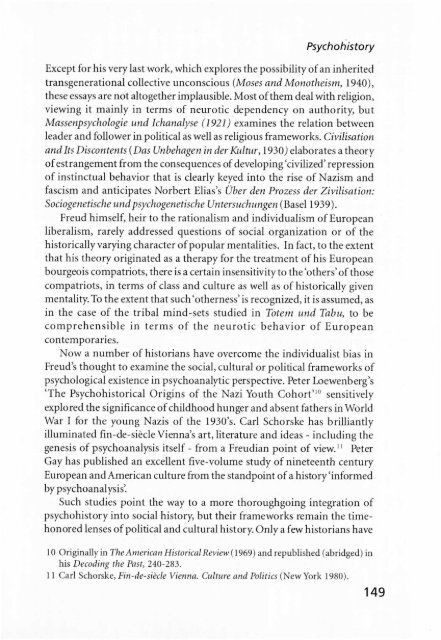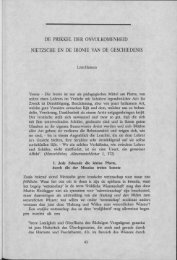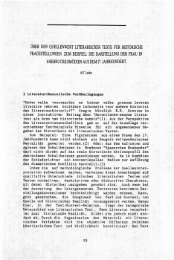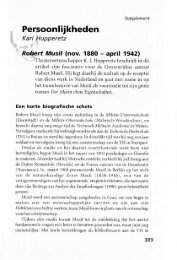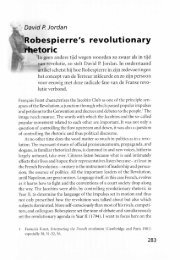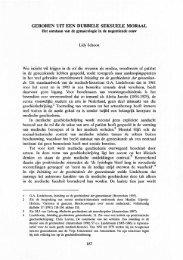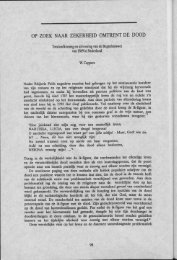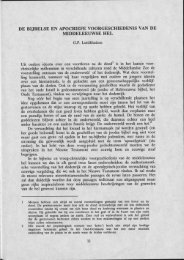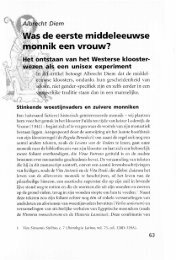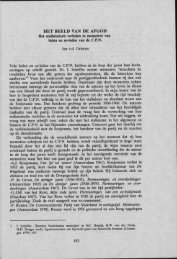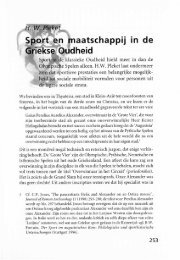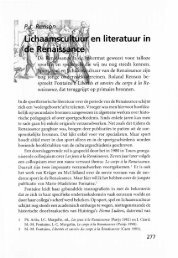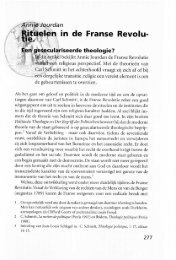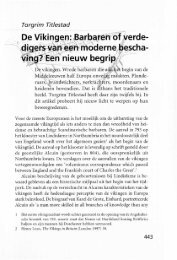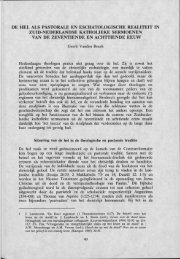di e'nsion - Groniek
di e'nsion - Groniek
di e'nsion - Groniek
Create successful ePaper yourself
Turn your PDF publications into a flip-book with our unique Google optimized e-Paper software.
Psych ohistory<br />
Except for his very last work, which explores the possibility ofan inherited<br />
transgenerational coilective unconscious (Moses and Monotheism, 1940),<br />
these essays are not altogether implausible. Most ofthem deal with religion,<br />
viewing it mainJy in terms of neurotic dependency on authority, but<br />
Massenpsychologie und lchanalyse (l921) examines the relation between<br />
leader and foilower in political as weil as religious frameworks. Civilisation<br />
and lts Discontents (Das Unbehagen in der Kultur, 1930) elaborates a theory<br />
ofestrangement fr om the consequences ofdeveloping 'civilized' repression<br />
of instinctual behavior that is clearly keyed into the rise of azism and<br />
fascism and anticipates Norbert Elias's über den Prozess der Zivilisation:<br />
Sociogenetische und psychogenetische Untersuchungen (BaselI939).<br />
Freud himself, heir to the rationalism and in<strong>di</strong>vidualism ofEuropean<br />
liberalism, rarely addressed questions of social organization or of the<br />
historically varying character ofpopular mentalities. In fact, to the extent<br />
that his theory originated as a therapy for the treatment of his European<br />
bourgeois compatriots, there is a certain insensitivity to the 'others' of those<br />
compatriots, in terms of class and culture as welJ as of historicalJy given<br />
mentality. To the extent that sueh'otherness' is recognized, it is assumed, as<br />
in the case of the tribal mind-sets stu<strong>di</strong>ed in Totem und Tabu, to be<br />
comprehensible in terms of the neurotic behavior of European<br />
contemporaries.<br />
ow a number of historians have overcome the in<strong>di</strong>vidualist bias in<br />
Freud' thought to examine the social, cultural or political frameworks of<br />
psychological existence in psychoanalytic perspective. Peter Loewenberg's<br />
'The Psychohistorical Origins of the azi Youth Cohort'lo sensitively<br />
explored the significance ofchildhood hunger and absent fathers in World<br />
War I for the young Nazis of the 1930's. Carl Schorske has brilliantly<br />
ilJuminated fin-de-siècle Vienna's art, literature and ideas - inclu<strong>di</strong>ng the<br />
genesis of psychoanalysis itself - from a Freu<strong>di</strong>an point of view. IJ Peter<br />
Gay has published an excellent five-volume study of nineteenth century<br />
European and American culture from the standpoint ofa history 'informed<br />
by psychoanalysis'.<br />
Such stu<strong>di</strong>es point the way to a more thoroughgoing integration of<br />
psychohistory into social history, but their frameworks remain the timehonored<br />
lenses of political and cultural history. OnJy a few historians have<br />
10 Originally in The American Historical Review (1969) and republished (abridged) in<br />
his Deco<strong>di</strong>ng the Past, 240-283.<br />
11 Carl Schorske, Fin-de-siècle Vienna. Culture and Polities (NewYork 1980).<br />
149


